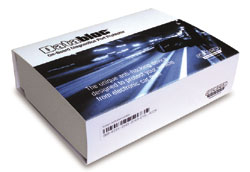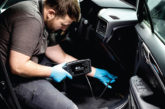
“How do we get back the 760,000 wasted police hours?” Lawrence Shaw, Director of car security specialists DATAbloc™, offers his suggestions for tackling the growing issue of e-car crimes.

The new wave of electronic car crime that is sweeping Britain is estimated to be soaking up over three quarters of a million* police force hours a year investigating criminals who steal ‘keyless’ or electronic ignition cars.
This may only be part of the story with many forces spending additional time in creating special crime units to combat the growing e-car theft issue.
Prevention: is it as easy as A-B-C?
I believe there are three key principles (DATAbloc’s™ ‘ABC’) that could be introduced to dramatically reduce the high level of police time spent on e-car crime:
 a) First of all, we have to make sure that ‘Port Protection’ is part of a PDI (Pre-Delivery Inspection) check on all new and used keyless cars. This would mean that any new owner has port protection, whether they realise it or not, to ensure peace of mind.
a) First of all, we have to make sure that ‘Port Protection’ is part of a PDI (Pre-Delivery Inspection) check on all new and used keyless cars. This would mean that any new owner has port protection, whether they realise it or not, to ensure peace of mind.
b) Secondly, car insurers should insist on ‘OBD Port Protection’ as part of insurance coverage and that a verified port protection product is fitted to any keyless car they insure.
c) Finally, the thieves are denied access to data readers, blank keys and the software and equipment so easily purchased over the Internet. The authorities, motor industry and car insurance companies must unite and insist that this vital piece of armoury in the criminal world is available to ‘authorised’ businesses only. I believe that we have a major opportunity to solve a growing dilemma with thoughtful solutions. By taking the right action now we can beat electronic car crime.
State of play
The current situation with e-car crime means that an average of 200** vehicles per week are stolen off London streets by thieves using data readers and computer equipment to clone a key, before driving off.
The UK national figure for specific electronic car or e-car theft is approaching 38,000*** vehicles. Even though car theft in general has been falling for the past two decades, e-car crime itself is spiralling out of control. One regional police force has even told me that they can’t keep up with the rate of e-car theft in their area.
Why the rapid rise in e-car crime?
Car thieves have got a lot smarter. They are now armed with computer devices and a hacker mentality and will steal ‘to-order’ sophisticated, expensive and sought-after BMW, Mercedes, Audi and Range Rover models – 40% of which are taken out of the country in less than 48 hours.
When you check the list of stolen models, the vast majority have a common feature – they all use electronic ignition/push button starting. This ‘keyless’ revolution is now utilised in around 4.1 million cars on Britain’s roads.
Open data ports are vulnerable to theft
The problem here is that criminals don’t have to steal the original keys to these cars – they can simply make their own. Key-cloning theft works by thieves accessing a vehicle’s OBD data port. This is easy to target as the data port is in most cases ‘open’, with not so much as a dust cover for protection.
This is an open invitation for criminals to connect their own equipment and software to the OBD port to steal the vehicle. With a supposedly ‘legitimate’ key they’re able to disarm the alarm system, potentially deactivate any tracking devices and voila…off they go!
REFERENCES AND FACTS
* Figures attained from police sources, based on the average time of 20+ hours taken to receive, record and follow up each stolen vehicle.
** London’s Metropolitan Police reported 21,000 vehicles stolen in the Capital in 2013, nearly half of which were attributable to e-car crime. The AA says an average value of a stolen car is £10,000, which adds up to £100 million in London and £380 million if the same ratio of approximately 50/50 is used nationally based on the London e-car theft ratio of stolen vehicles.
*** Car theft has fallen from 318,000 in 2002 to 77,500 in the last twelve months. Taking the London average of nearly 50% attributable to e-car crime, that works out at about 38,000 vehicles stolen across the UK as a result of e-car crime in 2013.
Source: UK Office for National Statistics.
‘BLOC’ BUSTERS COULD OFFER A SOLUTION
Fit-for-purpose products that create a barrier to the highly vulnerable OBD data port are available as we speak. By educating customers (car owners) about the dangers associated with e-crime, competent garages can offer a solution that can help protect their customers’ pride and joy from e-criminals.
 DATAbloc is physical technology that removes access to keyless start vehicle electronics, to prevent hacking e-car crime and theft. It works as a secure barrier between the OBD data port and any device that is attached to it. This includes data readers and key-cloning devices used by criminals to steal vehcles.
DATAbloc is physical technology that removes access to keyless start vehicle electronics, to prevent hacking e-car crime and theft. It works as a secure barrier between the OBD data port and any device that is attached to it. This includes data readers and key-cloning devices used by criminals to steal vehcles.
The range of products covers the majority of makes with electronic ignition/push button keyless start technology. These include BMW, Range Rover, Audi, Ford, Mini and VW. Professional or self-fit installation options are available.









